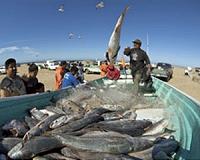| . |  |
. |
Providence RI (SPX) Apr 20, 2011 Policymakers are very familiar with land-use planning. But what is the best approach for planning uses of America's coastal waters and oceans? That question has gained importance since President Obama formed the National Ocean Council last summer and charged it with developing an ecosystem-based stewardship policy for the nation's oceans, coastal waters and the Great Lakes. A team of natural and social scientists led by Brown University offers some guidance. Published in the scientific journal Conservation Letters, the team's paper offers policy recommendations based on a two-year investigation of marine protection efforts by more than two-dozen local and regional projects from California to Maine. The authors find no group has a one-size-fits-all solution to managing a marine or freshwater area. But they write that many have come up with individual practices that, when combined, could help create an effective national ocean-management policy. "Every project is engaged in some new and effective ecosystem-based practices, but none of them is doing them all," said Leila Sievanen, a postdoctoral researcher in the Center for Environmental Studies at Brown University and the paper's lead author. "Together, though, they are demonstrating what could work on the national level." In July, Obama established the National Ocean Policy. The executive order stipulates "for the first time a comprehensive, integrated national policy for the stewardship of the ocean, our coasts and Great Lakes, which sets our nation on a path toward comprehensive planning for the preservation and sustainable uses of these bodies of water," according to the White House. The National Ocean Council, the body created to carry out the order, is expected to release a series of draft strategic action plans this summer. The paper's authors, which include Heather Leslie, an expert on marine ecosystem-based management at Brown, report several practices that they have observed to be successful in the field. They say including these elements in ocean planning will help bridge the gap between government regulations and grassroots efforts. "Many of the best practices we've observed come from local groups," Leslie said. "We expect that as the National Ocean Policy moves forward, these local efforts will continue to serve as a model for how to more proactively manage America's oceans." Contributing authors on the paper include Julia Wondolleck and Steven Yaffee at the University of Michigan, Karen McLeod at Oregon State University, and Lisa Campbell at Duke University. The David and Lucile Packard Foundation funded the research.
Share This Article With Planet Earth
Related Links the missing link Water News - Science, Technology and Politics
 BP feels fishermen's fury over Gulf oil spill
BP feels fishermen's fury over Gulf oil spillLondon (AFP) April 14, 2011 BP faced protests from angry fishermen and disgruntled shareholders on Thursday at its first annual general meeting since the devastating oil spill in the Gulf of Mexico. The meeting took place almost a year since the explosion on the Deepwater Horizon rig killed 11 workers and caused millions of gallons of oil to gush into the sea. Diane Wilson, a shrimp farmer from the Texas Gulf Coast ... read more |
|
| The content herein, unless otherwise known to be public domain, are Copyright 1995-2010 - SpaceDaily. AFP and UPI Wire Stories are copyright Agence France-Presse and United Press International. ESA Portal Reports are copyright European Space Agency. All NASA sourced material is public domain. Additional copyrights may apply in whole or part to other bona fide parties. Advertising does not imply endorsement,agreement or approval of any opinions, statements or information provided by SpaceDaily on any Web page published or hosted by SpaceDaily. Privacy Statement |